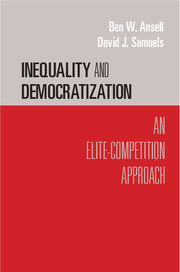Book contents
- Frontmatter
- Contents
- List of Tables
- List of Figures
- Preface
- I Introduction
- 2 Inequality, Development, and Distribution
- 3 Actors and Interests
- 4 An Elite-Competition Model of Democratization
- 5 Assessing the Relationship between Inequality and Democratization
- 6 Inequality and Democratization: Empirical Extensions
- 7 Democracy, Inequality, and Public Spending: Reassessing the Evidence
- 8 Democracy, Redistribution, and Preferences
- 9 Conclusion
- Bibliography
- Index
3 - Actors and Interests
Published online by Cambridge University Press: 05 January 2015
- Frontmatter
- Contents
- List of Tables
- List of Figures
- Preface
- I Introduction
- 2 Inequality, Development, and Distribution
- 3 Actors and Interests
- 4 An Elite-Competition Model of Democratization
- 5 Assessing the Relationship between Inequality and Democratization
- 6 Inequality and Democratization: Empirical Extensions
- 7 Democracy, Inequality, and Public Spending: Reassessing the Evidence
- 8 Democracy, Redistribution, and Preferences
- 9 Conclusion
- Bibliography
- Index
Summary
INTRODUCTION
The previous chapter revealed that in developing autocracies income inequality grows with the emergence of new non-agricultural groups – an industrial and commercial bourgeoisie, and the middle and working classes. In such societies the median voter typically remains quite poor and is located nowhere near the sociologically defined “middle” class – and even below the organized working class – on the income scale. Social tables strongly support the notion that most of the action in cases of regime change takes place well above the income of the median voter – among relative economic elites – and suggests that the median voter is unlikely to be a relevant actor in struggles for democracy.
Having located different social groups on the income distribution, in this chapter we lay out our argument's theoretical expectations about key socioeconomic actors' preferences, interests and likely political behavior. This provides support for our argument's key proposition: that competition over regime change occurs between groups near the top of the income scale and concerns fear of the state's expropriative power, not fear of the poor's redistributive threat.
The question of realism of assumptions is a difficult one for social-science theories. All theoretical assumptions are necessarily descriptively false, as they are heuristic devices employed to simplify, represent, and hopefully explain reality. Still, to assess different theories' relative fruitfulness, we should evaluate the relative descriptive and predictive accuracy of their assumptions.
We consider the interests of four groups: (1) incumbent elites, (2) the urban bourgeoisie and middle classes, (3) the working classes, and (4) the poor. After discussing our assumptions in the abstract, we illustrate the fruitfulness of our approach with evidence from the passage of the Second Reform Act in the UK, as well as with brief discussions of other cases – Imperial Germany, late 19th-century Sweden, 20th-century South Korea and contemporary China – that vary on both the dependent variable and on our key independent variables, in addition to obviously embodying different cultural and historical contexts.
- Type
- Chapter
- Information
- Inequality and DemocratizationAn Elite-Competition Approach, pp. 36 - 60Publisher: Cambridge University PressPrint publication year: 2014



